人力资源管理相关论文资料
企业人力资源管理论文(精选3篇)

企业人力资源管理论文(精选3篇)企业人力资源管理论文(精选3篇)在日常学习和工作生活中,大家都经常接触到论文吧,论文是我们对某个问题进行深入研究的文章。
相信写论文是一个让许多人都头痛的问题,下面是小编为大家整理的企业人力资源管理论文,欢迎阅读,希望大家能够喜欢。
企业人力资源管理论文1 摘要:现行绩效管理是企业人力资源管理系统的重要组成部分。
随着市场经济的飞速发展,各个单位机构都在不断完善自身的管理体系,以促进企业整体管理水平良性化健康发展;而加强企业内部的人事管理,是现行趋势下人力资源管理制度的工作体系重心所在。
文章在提出人力资源管理对企业绩效在不同的层面上有影响的基础上,对个体层面上人力资源管理对企业绩效的影响进行了详细探讨和总结。
关键词:人力资源;企业绩效;考核一、引言绩效考核考评制度是企业机构绩效管理系统的重心内容,同时绩效考核也是人力资源管理工作的基础性必要管理实施工作。
把握绩效考核的原则、方法和程序,了解考核标准与发掘能力之间的关系,有利于增强考核的效度和信度,提高组织的工作效率和个人的综合素质。
现行的企业人事管理已逐步面向了人力资源管理,而对于企业员工的管理不单是身份管理,更转变化为岗位职能管理,因此,员工考核测评、激励协调相结合的绩效考核管理制度的设立尤为重要,科学有效的绩效考核制度可以使所有员工找到、认清自身差异,并实现人尽其才、事得其人、人事相宜的组织管理目标。
正确对待和设立符合自身企业的考评机制,同时将定量考核与年度综合考核机制相互渗透、有机结合,可有效提高绩效考核的管理效用,并充分发挥出绩效管理的激励促进科学化管理作用,从而保证了企业整体管理职能的实现。
本文拟就绩效考核在企业中的应用,结合笔者自身从事人力资源管理工作实践和遇到的问题,进行初浅的探讨,力求找出解决问题的办法。
二、绩效考核工作目前普遍存在的问题近年来,经济管理中人力资源管理体系管理制度已成为主流趋势,很多企业已经认识到绩效考核的重要性,并且在考核的工作上投入了较大的精力,并通过绩效管理配合企业战略,提高企业竞争力,提升员工绩效;通过绩效考核进行激励与淘汰,进一步优化人才机制。
人力资源绩效管理论文10篇
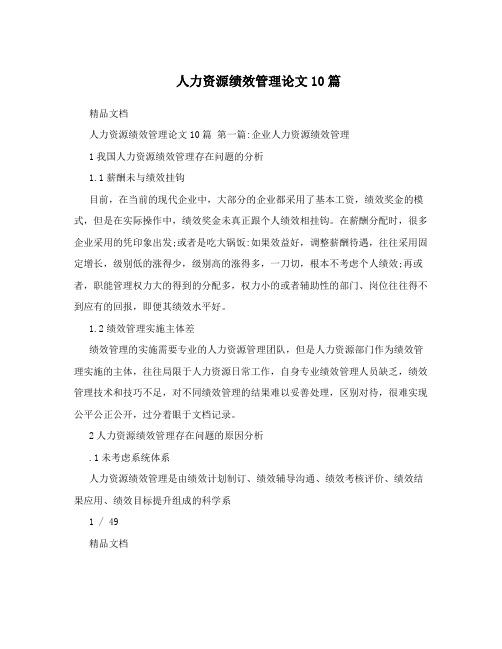
人力资源绩效管理论文10篇精品文档人力资源绩效管理论文10篇第一篇:企业人力资源绩效管理1我国人力资源绩效管理存在问题的分析1.1薪酬未与绩效挂钩目前,在当前的现代企业中,大部分的企业都采用了基本工资,绩效奖金的模式,但是在实际操作中,绩效奖金未真正跟个人绩效相挂钩。
在薪酬分配时,很多企业采用的凭印象出发;或者是吃大锅饭:如果效益好,调整薪酬待遇,往往采用固定增长,级别低的涨得少,级别高的涨得多,一刀切,根本不考虑个人绩效;再或者,职能管理权力大的得到的分配多,权力小的或者辅助性的部门、岗位往往得不到应有的回报,即便其绩效水平好。
1.2绩效管理实施主体差绩效管理的实施需要专业的人力资源管理团队,但是人力资源部门作为绩效管理实施的主体,往往局限于人力资源日常工作,自身专业绩效管理人员缺乏,绩效管理技术和技巧不足,对不同绩效管理的结果难以妥善处理,区别对待,很难实现公平公正公开,过分着眼于文档记录。
2人力资源绩效管理存在问题的原因分析.1未考虑系统体系人力资源绩效管理是由绩效计划制订、绩效辅导沟通、绩效考核评价、绩效结果应用、绩效目标提升组成的科学系1 / 49精品文档统。
而绩效考核则统筹是由绩效考核表来打分完成,不能成为体系,只能算是人力资源管理中的一个重要环节。
.2未考虑持续沟通著名绩效管理学家罗伯特•巴克沃曾在《绩效管理》一书中提出,绩效管理是一个持续的沟通过程,由员工和主管之间达成协议,协议中达成明确的目标,通过完成协议的形式将各方融入到绩效管理系统中去。
而持续沟通作为重要的管理方法和理念,贯穿于整个绩效管理始终。
从计划的制订,考核评价、结果应用等都离不开双向沟通,需要双方的积极响应,虽然绩效管理过程中的考核看似残酷,但从积极方面看,这也是双方共同探索,谋求成功和进步的机会。
.3未考虑员工是绩效管理的主人翁绩效管理中往往存在“考核出绩效”的误区,认为员工总是懒惰的,必须用严厉的绩效考核措施来考核员工,辅之以严厉的处罚措施,让员工产生畏惧,从而达到努力工作的目的。
人力资源管理论文3篇
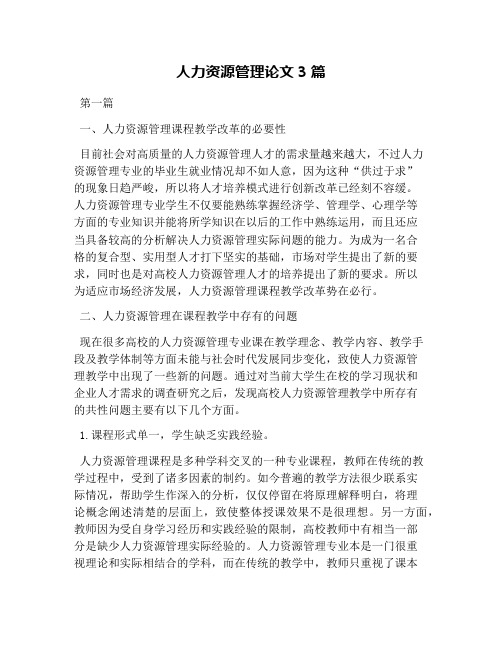
人力资源管理论文3篇第一篇一、人力资源管理课程教学改革的必要性目前社会对高质量的人力资源管理人才的需求量越来越大,不过人力资源管理专业的毕业生就业情况却不如人意,因为这种“供过于求”的现象日趋严峻,所以将人才培养模式进行创新改革已经刻不容缓。
人力资源管理专业学生不仅要能熟练掌握经济学、管理学、心理学等方面的专业知识并能将所学知识在以后的工作中熟练运用,而且还应当具备较高的分析解决人力资源管理实际问题的能力。
为成为一名合格的复合型、实用型人才打下坚实的基础,市场对学生提出了新的要求,同时也是对高校人力资源管理人才的培养提出了新的要求。
所以为适应市场经济发展,人力资源管理课程教学改革势在必行。
二、人力资源管理在课程教学中存有的问题现在很多高校的人力资源管理专业课在教学理念、教学内容、教学手段及教学体制等方面未能与社会时代发展同步变化,致使人力资源管理教学中出现了一些新的问题。
通过对当前大学生在校的学习现状和企业人才需求的调查研究之后,发现高校人力资源管理教学中所存有的共性问题主要有以下几个方面。
1.课程形式单一,学生缺乏实践经验。
人力资源管理课程是多种学科交叉的一种专业课程,教师在传统的教学过程中,受到了诸多因素的制约。
如今普遍的教学方法很少联系实际情况,帮助学生作深入的分析,仅仅停留在将原理解释明白,将理论概念阐述清楚的层面上,致使整体授课效果不是很理想。
另一方面,教师因为受自身学习经历和实践经验的限制,高校教师中有相当一部分是缺少人力资源管理实际经验的。
人力资源管理专业本是一门很重视理论和实际相结合的学科,而在传统的教学中,教师只重视了课本理论知识的讲解,未能和实际相结合,从而导致我国高校培养的人力资源管理专业人才掌握知识过于片面,对实践不够重视的现象。
2.课程的教学内容与市场需求脱节。
企业的需求随着社会经济的迅速发展,也在发生着巨大的变化,相对应的产生了各种新兴的人力资源管理理念和管理方式。
因为受到传统的教学模式的限制,致使很多学生毕业走上工作岗位后,会发现他们在学校所学的专业知识与企业的需求有相当大的鸿沟。
人力资源管理毕业论文范文四篇

人力资源管理毕业论文范文四篇(篇一)企业人力资源管理存在的理由与有效措施论文导读:本论文是一篇关于企业人力资源管理存在的理由与有效措施的优秀论文范文,对正在写有关于企业论文的写作者有一定的参考和指导作用,论文片段:摘要:在企业中人力资源是企业发展必备的资源之一,而人力资源管理则是企业管理当中的重点,当今社会,企业之间的竞争已经演变为企业间对人力的竞争。
目前,我国很多企业在人力资源管理方面仍存在较多理由,基于此,本文对人力资源管理中存在的理由进行了总结,并针对性的阐述了应对这些理由企业应该采取的措施。
关键词:人力资源管理;理由;应对措施;人才随着当今社会经济的不断发展,企业人力资源管理已经在企业管理中占据了很重要的地位,企业人力资源管理水平的高低与企业健康发展关系日益密切,企业要想在越来越激烈的市场竞争中存活并取得一定的发展就必须对人力资源管理加强重视。
因此,企业的发展与人才的引入息息相关,现代企业要想健康高速发展必须要将人力资源管理作为企业管理的重点。
1人力资源管理作用在经济与社会的发展历程中,人才及科技起着主导作用,这两者是社会进步的源泉,当今世界经济一体化的过程中,企业是市场竞争的主要成分,在互相竞争中,人才的储备对企业的作用不言而喻,而企业人力资源管理的优化在内才可激发企业员工潜力,在外可吸引优秀人才,而如果企业人力资源管理存在理由将严重影响企业的发展,因此企业在发展过程中必须要重视对人才的管理及培养。
另外,人力资源也是企业财富的一种体现,是企业高速发展的基础,企业要想在市场竞争中占据足够的优势,就必须高度重视人力资源的价值、作用及功能,这样企业才能够保证健康发展。
2人力资源管理存在的理由目前,在我国尤其是一些中小型企业在发展过程中,对人力资源管理的功能在认知上存在理由,企业管理者对人力资源管理重视程度不够,其将人力资源管理部门中原本的协调、监督作用放弃,而认为该部门就是一个权利集中部门,致使企业在发展中各种矛盾频发,极大的影响了企业的发展。
人力资源管理实践论文(精选五篇)
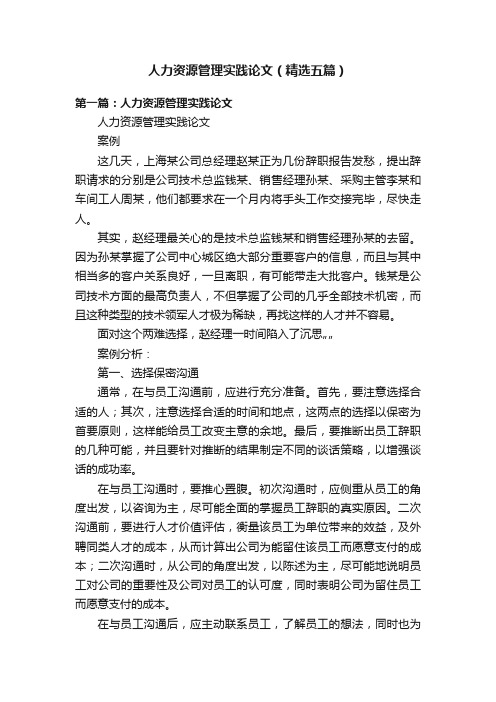
人力资源管理实践论文(精选五篇)第一篇:人力资源管理实践论文人力资源管理实践论文案例这几天,上海某公司总经理赵某正为几份辞职报告发愁,提出辞职请求的分别是公司技术总监钱某、销售经理孙某、采购主管李某和车间工人周某,他们都要求在一个月内将手头工作交接完毕,尽快走人。
其实,赵经理最关心的是技术总监钱某和销售经理孙某的去留。
因为孙某掌握了公司中心城区绝大部分重要客户的信息,而且与其中相当多的客户关系良好,一旦离职,有可能带走大批客户。
钱某是公司技术方面的最高负责人,不但掌握了公司的几乎全部技术机密,而且这种类型的技术领军人才极为稀缺,再找这样的人才并不容易。
面对这个两难选择,赵经理一时间陷入了沉思……案例分析:第一、选择保密沟通通常,在与员工沟通前,应进行充分准备。
首先,要注意选择合适的人;其次,注意选择合适的时间和地点,这两点的选择以保密为首要原则,这样能给员工改变主意的余地。
最后,要推断出员工辞职的几种可能,并且要针对推断的结果制定不同的谈话策略,以增强谈话的成功率。
在与员工沟通时,要推心置腹。
初次沟通时,应侧重从员工的角度出发,以咨询为主,尽可能全面的掌握员工辞职的真实原因。
二次沟通前,要进行人才价值评估,衡量该员工为单位带来的效益,及外聘同类人才的成本,从而计算出公司为能留住该员工而愿意支付的成本;二次沟通时,从公司的角度出发,以陈述为主,尽可能地说明员工对公司的重要性及公司对员工的认可度,同时表明公司为留住员工而愿意支付的成本。
在与员工沟通后,应主动联系员工,了解员工的想法,同时也为公司制定下一步策略争取时间。
第二、把眼光投放于内部人才和人才市场,重点借助于猎头公司这一点在沟通失败后重点采用,但是在实践中,一般从核心员工提出辞职时便开始行动,它的主要目的是衡量聘用该类人才的成本。
并且,通常核心人才流失,内部提升的方法很难凑效,因此,应该重点借助于猎头公司寻找核心人才的替代者。
第三、完善劳动合同劳动合同是在劳资双方权利和义务对等的情况下签订的,具有法律效力。
人力资源毕业论文7篇

人力资源毕业论文7篇人力资源师二级论文篇一摘要:人才竞争力是组织的核心竞争力之一,人力资源是组织最宝贵的资源。
大数据时代,随着人力资源管理信息量的加大,传统的人力资源管理理念和方法的滞后性越来越明显,如何利用信息化手段突破人力资源管理瓶颈,更为科学合理地管理和利用人力资源信息,更好地发挥人力资源管理效能,成为组织亟待解决的问题。
本文对信息化管理环境下,人力资源管理的特点进行了分析,并进一步就信息化环境下,人力资源管理的策略和措施进行了研究。
关键词:信息化环境;人力资源管理一、前言人力资源信息化管理即依托管理软件和高速、大容量硬件,将信息化技术用于人力资源管理,实现管理流程电子化,管理信息透明化,从而降低管理成本,提高规范化、科学化管理水平。
随着“互联网+”模式渗透到社会的各个领域,传统的管理模式已无法满足现代组织管理要求,需要借助信息化手段实现人力资源管理的转型。
但在这一过程中,很多组织未能结合自身实际制定出具体的实施方案,未能找准重点,往往为了转型而转型,匆匆上马人力资源信息化系统,致使信息化管理系统和人力资源管理现状“两张皮”,延长了实施周期,增加了实施成本。
因此,实现人力资源信息化管理,必须建立在对人力资源管理现状和需求进行分析,并对人力资源管理的重点和策略进行适当调整的基础上。
二、信息化环境下人力资源管理的特点(一)强调团队协作(二)强调个人价值信息化既是一种工具,也是一门技术,在信息化管理环境下,员工要想胜任手中的工作就必须改变原来的学习手段和交流方式,不断丰富和完善自身知识库。
从组织角度来看,在信息化战略中,组织应当更加重视员工素质的提高,加强学习型组织建设。
一方面着眼于组织发展,为员工提供更多的学习机会,帮助他们实现知识的更新换代。
另一方面,建立和完善相应制度机制,鼓励员工学习。
员工个人能力的提升不仅可以促进信息化战略的顺利实施,更能为组织积累雄厚的智力资本,从而更好地应对外部挑战和竞争,实现组织和员工的双赢。
人力资源管理论文完整版

人力资源管理论文完整版人力管理论文范文一:企业人力资源管理模式优化研究1网络经济时代概述网络经济是以信息技术为核心、建立在网络基础上的经济形态。
网络经济是随着信息技术产业的兴盛而发展壮大的,传统经济部门和传统产业的革新也促进了网络经济时代的发展。
网络经济时代并非是完全脱离传统经济的,而是建立在传统经济之上、优化企业创新发展的经济形态。
网络经济是国民、企业经济信息化的综合体现,企业将信息资源进行整合,通过信息技术和网络技术开展商务活动,让企业管理步入信息化,依托网络实现经济,因此,网络经济有效推动了传统企业经营管理模式的改革与发展。
2网络经济对企业人力资源管理的影响2.1网络经济对方式的影响网络经济时代的到来给企业的工作方式带来了前所未有的变化。
传统的企业组织结构决定了企业内部的竞争力,一成不变的企业结构和企业工作方式导致企业内部的人力资源失去工作竞争意识,网络经济注重对信息技术人才的开发和利用,迫使人才在激烈的竞争下及时学习最先进的技术知识,掌握时代前沿的信息技术,提升工作效率。
此外,网络经济时代对于互联网的应用,实现了远程办公、信息技术办公、办公结果实时监控的工作需求,电视会议、电子文档合作等信息技术的应用,使员工的工作氛围变得更加轻松,也为提高员工的工作灵活性提供了便利。
2.2网络经济对企业人力资源管理的影响人力资源管理对于企业的发展起着决定性作用,网络经济时代下,企业人才逐渐暴露出技术不足、创新意识不强的问题。
只有选择有利于企业发展的人才才是企业资源人力资源管理工作良好开展的基本条件。
网络经济的到来,促使企业人力资源管理必须注重信息人才地选拔和利用,对企业内部员工进行定期的网络经济相关知识和技术地培训,并以激励的方式提高其工作能力,用科学管理的手段开展人力资源管理工作。
想要保证企业在网络经济时代中持续稳定发展,就要全面提高人力资源管理水平,运用科学的管理技术,实现良好的管理效率。
3网络经济时代企业人力资源管理模式的优网络经济时代对企业人力资源管理优化提出了迫切的改革需求,那么企业就要多维度考量,从各方面优化企业管理,比如,树立人本观念,制定网络经济时代人力资源新标准,提高人才自我竞争意识和危机感,提升管理人员的管理水平。
人力资源毕业论文最新10篇

人力资源毕业论文最新10篇人力资源论文篇一摘要:员工的绩效管理决定了一个企业的发展,而人力资源的绩效管理又决定而员工绩效管理的水平。
因此企业的人力资源管理部门的员工绩效管理是十分重要的。
现如今采用的绩效管理方法是应用平衡计分卡来管理。
平衡计分卡作为一种崭新的、前沿的绩效管理方法与理念,主要是通过客户、财务、员工学习与成长、内部运作流程这四个方面进行实施管理,用全面的、量化的综合指标来评价企业的绩效管理水平。
通过在企业人力资源管理中应用平衡计分卡,有利于为企业指明发展战略方向,有利于增强核心竞争力,在市场上获得稳定长足的发展。
关键词:平衡计分卡;人力资源管理;应用21世纪作为新知识经济时代,知识资本在市场经济中的运用越来越受到人们的认识,发挥人的主观能动性与创意,是推动企业不断向前发展的巨大动力。
而企业的核心竞争力也体现在企业能否实行具有战略发展意义的人力资源管理。
人力资源的高效管理,往往能为企业的发展与内部控制获得更加坚实的基础,从而让企业在市场经济中立于不败之地。
平衡计分卡的诞生,为企业解决了两大难题:战略实施与绩效管理。
《哈弗商业评价》甚至将平衡计分卡比作是75年以来最具影响力的战略管理工具。
由此可见平衡计分卡对企业人力资源管理的重要意义与价值所在。
一、平衡计分卡介绍1、平衡计分卡的发展历史平衡计分卡又称为BSC(BalancedScoreCard),它是哈弗商学院的会计学教授罗伯特。
S.卡普兰与复兴全球战略集团的总裁兼创始人大卫。
P.诺顿在对全球领先的12家公司的绩效测评与管理进行为期一年的研究后发明的,并于1992年在《哈弗商业评论》中发表[2]。
随后被各大企业发展成为实施战略管理的有效工具。
《财富》杂志更是对1000强公司的调查统计中,表示全球1000强公司中有70%的企业都在使用平衡计分卡进行人力资源的绩效管理。
并根据有关国内的统计显示,中国将近有100家企业在使用平衡计分卡,并且有很多企业已经取得了相应的成功。
人力资源论文(优秀5篇)
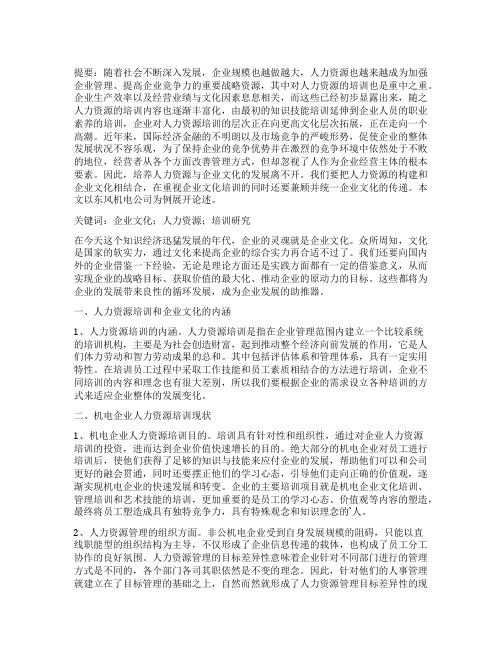
提要:随着社会不断深入发展,企业规模也越做越大,人力资源也越来越成为加强企业管理、提高企业竞争力的重要战略资源,其中对人力资源的培训也是重中之重。
企业生产效率以及经营业绩与文化因素息息相关,而这些已经初步显露出来,随之人力资源的培训内容也逐渐丰富化,由最初的知识技能培训延伸到企业人员的职业素养的培训,企业对人力资源培训的层次正在向更高文化层次拓展,正在走向一个高潮。
近年来,国际经济金融的不明朗以及市场竞争的严峻形势,促使企业的整体发展状况不容乐观,为了保持企业的竞争优势并在激烈的竞争环境中依然处于不败的地位,经营者从各个方面改善管理方式,但却忽视了人作为企业经营主体的根本要素。
因此,培养人力资源与企业文化的发展离不开。
我们要把人力资源的构建和企业文化相结合,在重视企业文化培训的同时还要兼顾并统一企业文化的传递。
本文以东风机电公司为例展开论述。
关键词:企业文化;人力资源;培训研究在今天这个知识经济迅猛发展的年代,企业的灵魂就是企业文化。
众所周知,文化是国家的软实力,通过文化来提高企业的综合实力再合适不过了。
我们还要向国内外的企业借鉴一下经验,无论是理论方面还是实践方面都有一定的借鉴意义,从而实现企业的战略目标、获取价值的最大化、推动企业的原动力的目标。
这些都将为企业的发展带来良性的循环发展,成为企业发展的助推器。
一、人力资源培训和企业文化的内涵1、人力资源培训的内涵。
人力资源培训是指在企业管理范围内建立一个比较系统的培训机构,主要是为社会创造财富,起到推动整个经济向前发展的作用,它是人们体力劳动和智力劳动成果的总和。
其中包括评估体系和管理体系,具有一定实用特性。
在培训员工过程中采取工作技能和员工素质相结合的方法进行培训,企业不同培训的内容和理念也有很大差别,所以我们要根据企业的需求设立各种培训的方式来适应企业整体的发展变化。
二、机电企业人力资源培训现状1、机电企业人力资源培训目的。
培训具有针对性和组织性,通过对企业人力资源培训的投资,进而达到企业价值快速增长的目的。
人力资源管理论文(通用15篇)
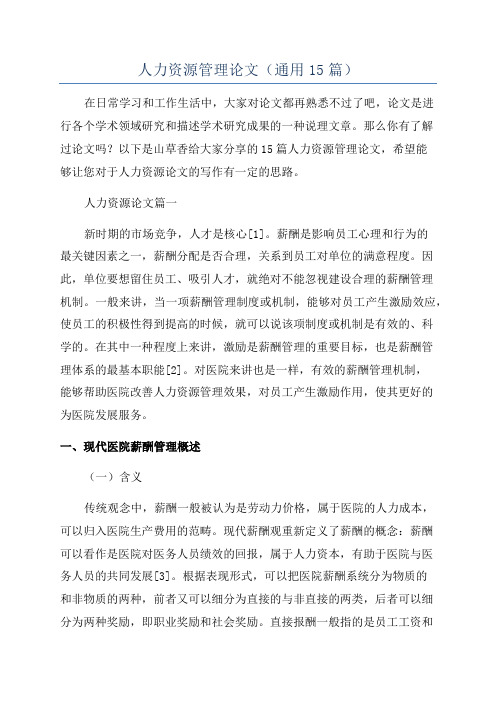
人力资源管理论文(通用15篇)在日常学习和工作生活中,大家对论文都再熟悉不过了吧,论文是进行各个学术领域研究和描述学术研究成果的一种说理文章。
那么你有了解过论文吗?以下是山草香给大家分享的15篇人力资源管理论文,希望能够让您对于人力资源论文的写作有一定的思路。
人力资源论文篇一新时期的市场竞争,人才是核心[1]。
薪酬是影响员工心理和行为的最关键因素之一,薪酬分配是否合理,关系到员工对单位的满意程度。
因此,单位要想留住员工、吸引人才,就绝对不能忽视建设合理的薪酬管理机制。
一般来讲,当一项薪酬管理制度或机制,能够对员工产生激励效应,使员工的积极性得到提高的时候,就可以说该项制度或机制是有效的、科学的。
在其中一种程度上来讲,激励是薪酬管理的重要目标,也是薪酬管理体系的最基本职能[2]。
对医院来讲也是一样,有效的薪酬管理机制,能够帮助医院改善人力资源管理效果,对员工产生激励作用,使其更好的为医院发展服务。
一、现代医院薪酬管理概述(一)含义传统观念中,薪酬一般被认为是劳动力价格,属于医院的人力成本,可以归入医院生产费用的范畴。
现代薪酬观重新定义了薪酬的概念:薪酬可以看作是医院对医务人员绩效的回报,属于人力资本,有助于医院与医务人员的共同发展[3]。
根据表现形式,可以把医院薪酬系统分为物质的和非物质的两种,前者又可以细分为直接的与非直接的两类,后者可以细分为两种奖励,即职业奖励和社会奖励。
直接报酬一般指的是员工工资和奖金等,非直接报酬则指的是员工福利和假期等。
职业奖励指的是晋升机会等带有职业性质的奖励,社会奖励指的是社会肯定等来自社会的赞扬。
(二)构成目前,医院实行的薪酬制度一般是岗位绩效制。
在该制度下,员工工资=岗位工资+薪级工资+绩效工资+补贴。
在具体实施中,医院可依据自身情况对每个组成部分的比例进行适当的调整,以形成有效的激励效应。
岗位工资是员工所在岗位要求与岗位职责的统一体现,岗位等级不一样,工资标准也不同。
2023年人力资源管理毕业论文(6篇)
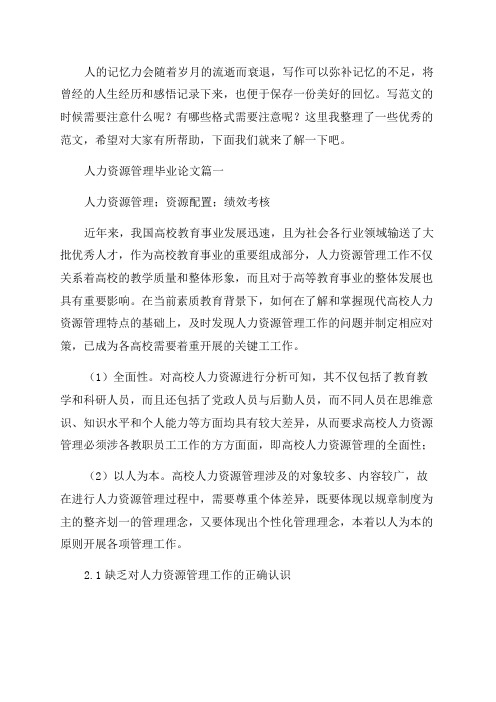
人的记忆力会随着岁月的流逝而衰退,写作可以弥补记忆的不足,将曾经的人生经历和感悟记录下来,也便于保存一份美好的回忆。
写范文的时候需要注意什么呢?有哪些格式需要注意呢?这里我整理了一些优秀的范文,希望对大家有所帮助,下面我们就来了解一下吧。
人力资源管理毕业论文篇一人力资源管理;资源配置;绩效考核近年来,我国高校教育事业发展迅速,且为社会各行业领域输送了大批优秀人才,作为高校教育事业的重要组成部分,人力资源管理工作不仅关系着高校的教学质量和整体形象,而且对于高等教育事业的整体发展也具有重要影响。
在当前素质教育背景下,如何在了解和掌握现代高校人力资源管理特点的基础上,及时发现人力资源管理工作的问题并制定相应对策,已成为各高校需要着重开展的关键工工作。
(1)全面性。
对高校人力资源进行分析可知,其不仅包括了教育教学和科研人员,而且还包括了党政人员与后勤人员,而不同人员在思维意识、知识水平和个人能力等方面均具有较大差异,从而要求高校人力资源管理必须涉各教职员工工作的方方面面,即高校人力资源管理的全面性;(2)以人为本。
高校人力资源管理涉及的对象较多、内容较广,故在进行人力资源管理过程中,需要尊重个体差异,既要体现以规章制度为主的整齐划一的管理理念,又要体现出个性化管理理念,本着以人为本的原则开展各项管理工作。
2.1缺乏对人力资源管理工作的正确认识(1)部分高校尚未建立科学的人事管理制度,而既有的人事管理方法和手段过于机械化,在违背了以人为本的管理原则的基础上,也引发了教职工的反感;(2)高校人力资本投资渠道较为单一,目前,多数高校的人力资源开发大都对岗位培训和外地引进具有较强的依赖性,并未针对既有教职员工的情况和岗位制定出相应的工作目标,在降低人力资本边际效率的同时,也阻碍高校整体管理水平的提升。
2.2人力资源配置效率低对当前多数高校的人力资源分布情况进行分析可知,一方面,较为热门的专业,如食品科学、机电自动化、计算机信息等专业的人才严重匮乏,且既有专业教学人员的流动性较强,人力资源的稳定性较差。
有有关人力资源管理方面论文

有有关人力资源管理方面论文有关于人力资源管理方面的论文有关于人力资源管理方面的论文篇1浅析企事业单位经济师人力资源管理的问题人力资源管理在一个企事业单位内部起着至关重要的作用,在如今一个经济知识同发展的时代里,运用而生了一种高效的管理模式,经济师人力资源管理。
当然,在每一个企事业单位的发展过程中,会存着不同情况的问题,而本文则针对几种比较常见的经济师人力资源管理的问题进行深入的讨论。
一、企业实行人力资源的目的所谓的人力资源,是在一个企事业单位中,根据企业性质所制定出的结构体系,针对这些结构体系的需求所引入人力资源,并且对其定期的培训,对于公司人力资源的一个有效整合与利用,并且让员工尽最大能力的对企业作出一定的价值、贡献等,达到学有所用,劳有所得的效果要。
通俗的讲,就是人力资源在企事业单位是作为一个管理层,通过结合管理机制、有效沟通指导,从而采用一种管理的形式,对于人力资源进行有效的运用,既可以实现个人的目标,也可以促进人与人之间的合理组合,从而提高工作的效率,达到企业的利益最大化。
二、企事业单位经济师人力资源管理存在的问题(一)人力资源没有完整的计划作为一个企事业单位的人力资源,其工作是具有一定的长期性与综合性,而且对于一个企事业的发展起着非常重要的作用。
但在我国很多的企业中,对于人力资源这一岗位的理解,往往还停留在表面工作之上,并没有深刻的意识到经济师人力资源对于企业发展的重要性,因此,在很多企事业单位中,经济师人力资源管理的方法还相对比较单一,而且也没有根据企业的实际情况制定出相应的长远计划,如此看来,对于企事业单位的发展起到了阻碍性的作用。
因此,经济师人力资源管理需要有一个长期健全的计划。
(二)管理机制不健全在很多企业,都没有单独的设立经济师人力资源管理部门,从而直接影响到了企事业单位对于招聘人才的情况,除此之外,作为一个经济师人力资源管理中最为重要的一项工作,就是有效的调动发挥出员工的积极性与热情。
人力资源管理专业本科毕业论文
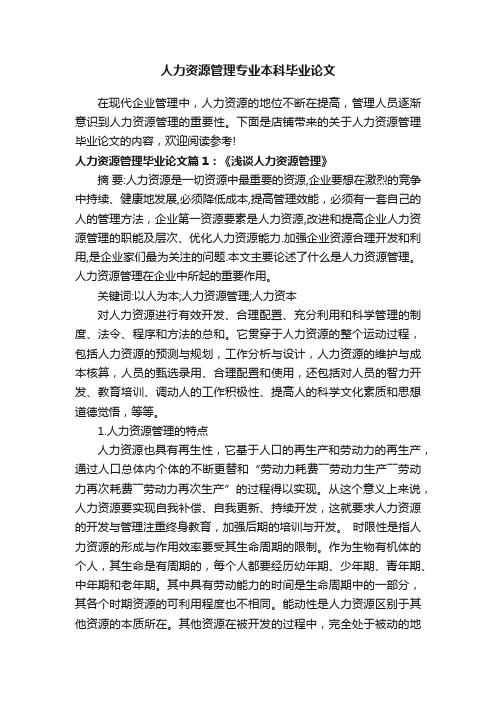
人力资源管理专业本科毕业论文在现代企业管理中,人力资源的地位不断在提高,管理人员逐渐意识到人力资源管理的重要性。
下面是店铺带来的关于人力资源管理毕业论文的内容,欢迎阅读参考!人力资源管理毕业论文篇1:《浅谈人力资源管理》摘要:人力资源是一切资源中最重要的资源,企业要想在激烈的竞争中持续、健康地发展,必须降低成本,提高管理效能,必须有一套自己的人的管理方法,企业第一资源要素是人力资源,改进和提高企业人力资源管理的职能及层次、优化人力资源能力.加强企业资源合理开发和利用,是企业家们最为关注的问题.本文主要论述了什么是人力资源管理。
人力资源管理在企业中所起的重要作用。
关键词:以人为本;人力资源管理;人力资本对人力资源进行有效开发、合理配置、充分利用和科学管理的制度、法令、程序和方法的总和。
它贯穿于人力资源的整个运动过程,包括人力资源的预测与规划,工作分析与设计,人力资源的维护与成本核算,人员的甄选录用、合理配置和使用,还包括对人员的智力开发、教育培训、调动人的工作积极性、提高人的科学文化素质和思想道德觉悟,等等。
1.人力资源管理的特点人力资源也具有再生性,它基于人口的再生产和劳动力的再生产,通过人口总体内个体的不断更替和“劳动力耗费――劳动力生产――劳动力再次耗费――劳动力再次生产”的过程得以实现。
从这个意义上来说,人力资源要实现自我补偿、自我更新、持续开发,这就要求人力资源的开发与管理注重终身教育,加强后期的培训与开发。
时限性是指人力资源的形成与作用效率要受其生命周期的限制。
作为生物有机体的个人,其生命是有周期的,每个人都要经历幼年期、少年期、青年期、中年期和老年期。
其中具有劳动能力的时间是生命周期中的一部分,其各个时期资源的可利用程度也不相同。
能动性是人力资源区别于其他资源的本质所在。
其他资源在被开发的过程中,完全处于被动的地位;人力资源则不同,它在被开发的过程中,有思维与情感,能对自身行为作出抉择,能够主动学习与自主地选择职业,更为重要的是人力资源能够发挥主观能动性,有目的、有意识地利用其他资源进行生产,推动社会和经济的发展。
人力资源管理现状对策研究毕业论文(共5篇).doc
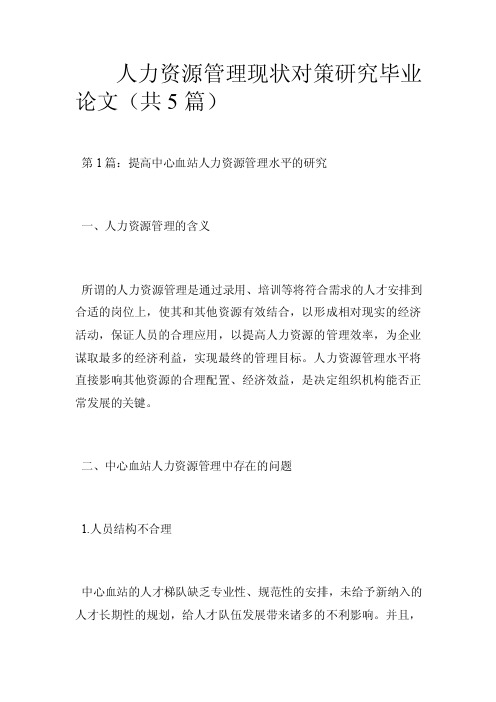
人力资源管理现状对策研究毕业论文(共5篇)第1篇:提高中心血站人力资源管理水平的研究一、人力资源管理的含义所谓的人力资源管理是通过录用、培训等将符合需求的人才安排到合适的岗位上,使其和其他资源有效结合,以形成相对现实的经济活动,保证人员的合理应用,以提高人力资源的管理效率,为企业谋取最多的经济利益,实现最终的管理目标。
人力资源管理水平将直接影响其他资源的合理配置、经济效益,是决定组织机构能否正常发展的关键。
二、中心血站人力资源管理中存在的问题1.人员结构不合理中心血站的人才梯队缺乏专业性、规范性的安排,未给予新纳入的人才长期性的规划,给人才队伍发展带来诸多的不利影响。
并且,不重视人力资源管理队伍的建设,导致中心血站的人才管理出现尴尬的局面,降低管理水平。
2.缺乏专业性的人才资源血站属于医疗服务机构,但职业的发展情况不如医院。
医学院所毕业的学生大多倾向于临床,高层次的人才更是招不到,增加了人才之间的矛盾。
在中心血站编制有限的情况下,配置的专业性的卫技人员要具备从业执照,具备独立性的签字权,才不会引发法律纠纷。
但中心血站普遍存在卫技人员学历低的现象,增加人力资源的管理难度,情况严重时还会给血液的安全性埋下诸多隐患。
3.存在人力资源布置、浪费现象从实际情况上来讲,中心血站缺乏人力资源的管理依据,导致无法科学、合理的配置人力资源。
目前在血站的日常工作中,尚不具备明确性的人才培养计划和目标,无法留住人才,降低了人力资源的管理水平。
三、提高中心血站人力资源管理水平的有效措施1.中心血站的战略性人力资源管理战略性的管理是指借助战略性的眼光科学、合理的组织、控制人力资源,最为主要的目的是保证血站组织机构获得更多优秀的人才,使血站获取强烈的竞争优势,实现最终的人力资源管理目标。
血站作为医疗服务机构,人力资源管理工作主要包括分析工作、绩效管理、合理规划人力资源、人力资源的培训管理等。
伴随着科学技术的不断发展,血站的血液安全管理工作得到社会各界的广泛关注,血液的采集、血液的应用等工作存在各种隐患,科学、合理的利用血站的人力资源,是推动采血、供血事业稳步发展的关键。
人力资源方面的论文

人力资源方面的论文人力资源方面的论文(精选9篇)人力资源方面的论文篇1摘要:人力资源是企业建立现代企业制度过程中一项非常重要的组成部分,也是企业提升管理水平的关键要素之一。
本文对人力资源管理在当代企业管理中的作用进行了简要分析,从四个方面分别进行了阐述,具有一定的理论参考价值。
关键词:人力资源管理;企业管理;现代企业制度1人力资源管理是企业发展的根本现代企业的经营管理活动过程中,离不开人、财、物三个方面的要素,其中,财力资本作为企业的运营基础,一直受到了所有企业的广泛重视,而近年来随着社会进入到信息化社会,人力资本在企业中所起的作用越来越突出,像是国外的微软、谷歌、Facebook等信息企业,以及苹果、甲骨文等高科技企业,都是完全取决于人的作用发挥,国内近些年来一些发展比较好的企业,如华为等,也完全是优秀人才支撑起来,国内已经有越来越多的企业认识到了这一点,在不断挖掘其他企业优秀人才的同时,也在不断培养自己的人才体系,这一切都建立在人力资源管理基础上。
因为企业活动最终还是依靠人来完成,财力物力也需要人来进行支配,前两者是死的,人是活的,所以,企业只有把人管理好了,生产经营活动就可以有条不紊地进行。
而企业中所拥有的高素质人才,更是可以为企业的发展提供强大的智力支持,更可以成为企业领先其他企业的独特优势资源,推动企业更快更好的发展。
2人力资源管理能够为企业带来良好的经济效益从上个世纪四十年代以后,在全球进入稳定发展期后,企业管理的相关研究逐渐活跃,各种企业管理制度也不断涌现,为企业的成长提供了巨大的理论支持,如马斯洛(A.H.Maslow)的需求层次理论、赫茨伯格(F.Herzberg)的双因素理论等都涉及到了人力资源管理的范畴,而到了八十年代以后,企业管理逐渐转向企业战略管理为主,其中又以学习型组织的研究最为集中,人力资源管理也在这一阶段成为各大企业研究的热点,这是得益于这些研究,现代企业才可以做到以消费者需求为企业发展原动力,不断提升自己适应社会的能力。
人力资源管理探究论文(3篇)-资源管理论文-管理论文

人力资源管理探究论文(3篇)-资源管理论文-管理论文——文章均为WORD文档,下载后可直接编辑使用亦可打印——第一篇:现代人力资源管理的核心探析一、什么是胜任力模型在人力资源管理中经常遇到这样的问题,工作职责和业绩标准都已经很明确了,但有的员工无论如何也达不到规定的业绩标准,再多的培训也没用。
于是问题就提出了:是否在每个人的内在都有一些因素很大程度上关联到他们的绩效表现,但是却不太受培训指导的影响?经过几十年的研究,西方的心理学家和管理学家,逐渐提出了能力素质的概念。
能力素质指向的是人内在的,与行为表现有关的,但较难被他人准确认识的特征、品质和条件,既包括知识、技能、经验这些通常人力资源管理上所关注的个人特质,也包括智力、性格、价值观、兴趣、自我认知、社会认知等一系列隐性的心理特征。
这些隐性的心理特征可以通过一些复杂的测试,或者长期的观察来判断,但却无法仅凭短期简单的观察或未经深度打磨的简单测试来衡量。
因此,普通的人力资源管理方法是无法解决包括这些因素在内的人力资源管理问题的。
胜任力指的是员工胜任某个岗位工作所需要具备的个人特征和条件,能力素质正是它的核心组成部分。
但与能力素质不同的是,胜任力有时也指向能够满足工作某方面要求或体现员工表现绩效潜力的一些外在显性条件,比如专业、学历、资质、工作年限等等。
胜任力模型,就是描述一个企业各个岗位、各项工作需要员工具备的胜任力条件的管理工具。
它能够为企业提供全面管理员工胜任力的纲领,所以毫无疑问是现代人力资源管理最核心的内容。
对于工程建筑企业来说,之所以更需要强调胜任力,而不是能力素质,一方面是因为国内工程建筑行业的管理,要求企业获得一定的行业资质,而获得行业资质的基础之一就是人员的职业资格,这一点能力素质并不包括;另一方面是因为工程建筑行业是一个需要大量专业知识技能的行业,而能力素质的狭义理解仅包括与绩效相关的通用个人特质,即各个行业、各个企业都能使用,但与具体行业、企业密切相关的专业知识技能并不包含在内。
人力资源管理的论文(通用9篇)
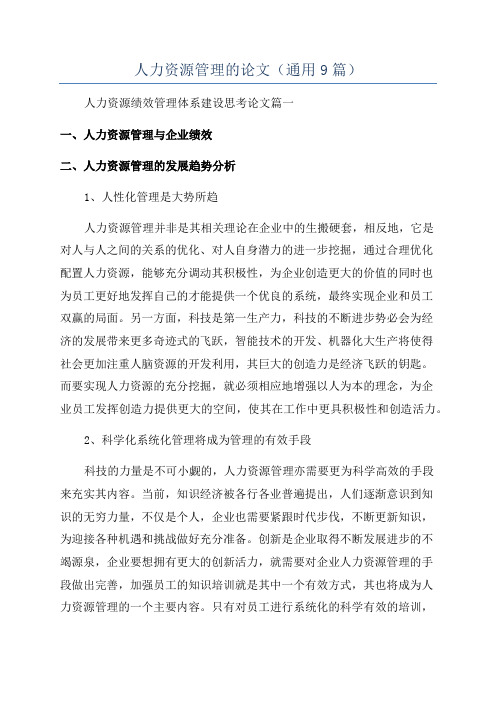
人力资源管理的论文(通用9篇)人力资源绩效管理体系建设思考论文篇一一、人力资源管理与企业绩效二、人力资源管理的发展趋势分析1、人性化管理是大势所趋人力资源管理并非是其相关理论在企业中的生搬硬套,相反地,它是对人与人之间的关系的优化、对人自身潜力的进一步挖掘,通过合理优化配置人力资源,能够充分调动其积极性,为企业创造更大的价值的同时也为员工更好地发挥自己的才能提供一个优良的系统,最终实现企业和员工双赢的局面。
另一方面,科技是第一生产力,科技的不断进步势必会为经济的发展带来更多奇迹式的飞跃,智能技术的开发、机器化大生产将使得社会更加注重人脑资源的开发利用,其巨大的创造力是经济飞跃的钥匙。
而要实现人力资源的充分挖掘,就必须相应地增强以人为本的理念,为企业员工发挥创造力提供更大的空间,使其在工作中更具积极性和创造活力。
2、科学化系统化管理将成为管理的有效手段科技的力量是不可小觑的,人力资源管理亦需要更为科学高效的手段来充实其内容。
当前,知识经济被各行各业普遍提出,人们逐渐意识到知识的无穷力量,不仅是个人,企业也需要紧跟时代步伐,不断更新知识,为迎接各种机遇和挑战做好充分准备。
创新是企业取得不断发展进步的不竭源泉,企业要想拥有更大的创新活力,就需要对企业人力资源管理的手段做出完善,加强员工的知识培训就是其中一个有效方式,其也将成为人力资源管理的一个主要内容。
只有对员工进行系统化的科学有效的培训,不断更新员工的知识和相关技能,才能够增强企业的造血功能,使企业在市场竞争中更具活力。
三、人力资源管理对企业绩效的影响1、将科学发展观应用于实践科学发展观被提出多年,但由于各方面综合因素的作用,并未能全面覆盖于各个企业中,而通过人力资源管理提升企业绩效,是科学发展观应用于企业实践活动的具体体现。
运用科学合理的人力资源管理手段,将人才的价值充分发挥出来,保障人力资源与企业其他各项资源之间协调分工,实现企业的高效运作,为企业的科学发展开辟新路。
- 1、下载文档前请自行甄别文档内容的完整性,平台不提供额外的编辑、内容补充、找答案等附加服务。
- 2、"仅部分预览"的文档,不可在线预览部分如存在完整性等问题,可反馈申请退款(可完整预览的文档不适用该条件!)。
- 3、如文档侵犯您的权益,请联系客服反馈,我们会尽快为您处理(人工客服工作时间:9:00-18:30)。
The USV Annalsof Economics and Public Administration Volume 15, Issue 1(21),2015INKING HUMAN RESOURCES STRATEGY WITH KNOWLEDGE MANAGEMENT STRATEGY TO DRIVE MEASURABLE RESULTSOtilia‐Maria BORDEIANUStefan cel Mare University of Suceava, Romaniaotilia@v.roSimona BUTAStefan cel Mare University of Suceava, Romaniasimonab@v.roAbstract:Today the human resources are seen as a very valuable asset to achieve long-term performance. Today we understand that every employee is required to learn throughout life, so to acquire new knowledge, to process such knowledge and possibly disseminate expertise with other members of the organization. The theory on human resources in various organizations has changed over time; recommendations have become more numerous, but there is no consensus on the subject. In other words, the permanent change which defines the competitive environment of business remains a type of constant when analysing the efficiency of human resources within companies; inter-individual relations (formal and informal) and the values to which each employee relates remains crucial for any theoretical construction in this area. Principles and strategies applied by organizations yesterday could prove their inefficiency today; human resource strategies in organizations today should include a separate subcomponent, we believe, i.e. knowledge management (KM) strategy. This is because the competitive advantage obtained or maintained by the company depends today, in large proportion, on the type, quality and value of knowledge possessed by the organization. Therefore, organizational strategy and thus the strategy of acquisition, developing and rewarding of human resources (HR) should take into account this reality from the global environment. Moreover, in the current knowledge-driven economy, organizations must know how to develop and implement knowledge-based strategies to drive measurable business results. The goal of this paper is to describe a potential relation between the overall company strategy, HR strategy and KM strategy.Key words: human resources, human resources management, knowledge management, knowledge economy, strategyJEL classification: M10, M12.1. INTRODUCTIONIn the current economy there is a new approach to human resource management, so as to be able to cope with many types of challenges.The most relevant resources within the knowledge economies are: knowledge, intellectual capital and time (Tottderdill, 2002). Being the only source that has the ability to think and implement new ideas, people occupies the central position within organisations. People are considered the only true source of sustainable competitive advantage. Since knowledge belong to the employees, any activity of the employees will affect the knowledge management. HRM could lead the development of well-rounded KM strategies to add value. HRM face new challenges: to recruit and retain top talent, and to embrace a new skill set to add more value. The HR department has a very crucial and vital role to play in not just its formation but also in giving KM its shape. The new type of human resource management (HRM), evidenced in knowledge-based firms has several characteristics that differ from classic human resource management (Todoruț et al, 2011). First, the focus in addressing human resources is related to amplification and efficient treatment of knowledge. There is also a need of intensive differentiation of approaches, decisions, actions and behaviour of specialists in human resources management, to be able to effectively consider the heterogeneity of human resources involved in the organization, their characteristics, motivations and expectations. HR activities must be designed and implemented in a flexible way, constantly changing content and functions, in accordance with endogenous and exogenous evolutions of theorganization; finally, all human resource activities must be coordinated in accordance with performance objectives of the company, to ensure its sustainability.Because knowledge management is a fundamental business enabler, it will help organisations to protect their intellectual capital, to focus on their most important assets: their human capital, to link people to people by setting up collaborative methods and re-orient their culture by developing an optimal knowledge sharing strategy.2. HUMAN RESOURCES FROM THE STRATEGIC VISION OF TOP MANAGEMENTAnalysing the human resources in organizational context, implicitly the strategic vision of the top management upon them, we identify two diametrically opposed situations, models based on different assumptions on the motivation of human resources (the McGregor optics - the theory of X and Y); we understand that the motivating factor on the employee was and remains one crucial in trying to explain the performance obtained. Most often, the management theory and the business administration theory discusses about a positive motivation regarding the employee (salary, bonuses, promotion, negotiation, shared objectives, etc.) and a negative motivation regarding the organization members (sanctions, removal of the group, layoffs, etc.). The motivation in the organizational context regarding the "n" employees that an entity dispose, depends to a certain extent on the management styles practiced by various executives, on the daily relationship between bosses and subordinates, on the type of leadership which is required by the senior management and depends on the values that give the content to the organizational culture. In other words, intuitively we notice certain connections between the theoretical developments concerning the motivation in management and theory of human capital and / or intellectual capital from the business organizations.The first perspective concerning motivation, considers that organizations exist only as a sum of "n" individuals (seen as "parts") who work together in order to achieve certain objectives. This perspective is based on a worst-case scenario, enshrined by the traditional optics upon the individual against work, optics that was valid in the industrial enterprise from the beginning of the nineteenth century; basically, this traditional conception considers that (McGregor, 1967): –the usual individual is evil by its nature and manifests "an inconvenience inherent to work and will avoid it whether he can"; it comes to the typical employee encountered in the classic enterprise, that behaves as a rational person, person belonging to a certain cultural matrix (McGregor, 1960, p. 32);–due to this characteristic, most people / employees should be obliged, controlled, punished etc. in order to target their efforts toward the "achievement of the organizational objectives” (McGregor, 1960, p. 32);The second perspective, aiming to motivate the employee, diametrically opposed, considers that human beings cannot exist without a certain social context such as the organization; this assumption starts from another extreme hypothesis, consecrated by "the idealistic optics” towards the individual in the labour process; basically, this view suggests that:–the ordinary man "does not dislike working" and spending the physical or mental effort can become, under certain created circumstances, a pleasure or a source of satisfaction (McGregor, 1960, p. 47);–applying the external control is not the only solution for directing the effort toward the organizational objectives, because the individual may self-control / self-drive in order to achieve "the objectives for which he has committed";–commitment to company goals is a function of an associated reward, therefore, the employee expects a reward when obtaining the performance etc..Table no. 1. Different perspectives on human resources in the organizational context Autocratic Paternalist Supportive Collegially MotivationalThe basic model Power EconomicresourcesLeadership Partnership AlignmentOrientation / managerial vision Authority Money Support Team Coaching(Mentoring)Orientation / vision on employees ObedienceSecurity andbenefitsPerformanceat workResponsiblebehaviourCompetence andaccomplishment /achievementThe psychological consequences of the employees Dependenceon the chiefDependence onthe organizationParticipation Self- discipline Fluency / flowFulfilling the needs of employees Subsistence Security RespectEsteem /considerationSelf-realizationThe guaranteed performance MinimalPassivecooperationSupportingunitsModerateenthusiasmDedicationSource: Processing after Newstrom, John W. & Davis, Keith (1993), Organizational Behavior: Human Behavior at Work. New York: McGraw-Hill, Timmers J. S., Mennes M. A. (1998), Fundamentals on Design of Satisfaction Questionnaires, The European Foundation for Quality Management, BrusselWe will not emphasize the issues related to employee motivation in the organizational context as they are relatively well individualized in the management theory and the optics of the decision-makers from the performing companies has changed greatly over the past three decades. After the appearance of the paper "In search of excellence" (1982), the human resources, including their motivation, have somehow definitively entered in the attention of the "top" management from various companies. The arguments brought by theorists, various people who have held positions of CEO, opinion leaders, extremely tough global competition etc. have required important changes regarding the theoretical hypostasis of the human resource position is in the modern company (Toffler, 2006). Synthetic, in the table no. 1, we present some guidelines on human resources at the level of business organizations.3. LINKING HR STRATEGY WITH KM STRATEGYToday the resources are seen as a very valuable asset for achieving the long term performance (various models / guidelines discuss about cooperation, participation, respect, enthusiasm, self-realization, dedication, etc.); Today we understand that every employee is required to lifelong learn, therefore, to acquire new knowledge, such knowledge to process and eventually to disseminate his/her expertise to other members of the organization.The theoretical/pragmatic optics on human resources in various organizations has changed a lot over time; the approaches and the theoretical recommendations have become more numerous, but there is no consensus on the subject. In other words, the permanent change which defines the competitive business environment remains a type of constant when analysing the efficiency of human resources within companies; inter-individual relations (formal and informal) as well as the values to which each employee reports, are, nonetheless essential assets for any theoretical construction in this area. As implied by Ducker, the principles or the strategies implemented yesterday by organizations, might prove their inefficiency today (Drucker, 2004); the human resources strategies in organizations today should include a separate subcomponent, we believe, that is KM strategy. This is because the competitive advantage obtained/maintained by the company depends today, overwhelmingly by the type, quality and the value of the knowledge that the organization possess.Therefore, the organizational strategy and thus the acquisition strategy, development and reward human resources (HR) strategy should take into account this reality globally encountered. It is difficult to say as a theoretical description, what is the most appropriate relationship between theoverall company strategy, the HRM strategy and the KM strategy; the experience and the imagination of the decision maker from a particular company must find the right answer to the question raised. From the perspective of our research, in Figure 1 we suggest only the essential components from which one can start to build an effective strategy which can favour the acquisition of knowledge, satisfaction and self-realization of employees and the annual performance of the organization.Figure no. 1. Directions of HRM in business fieldTherefore currently the human resources management concerns in our optics, three basic directions (Figure no. 1. and 2.): Human resources activities (A); values and organizational/corporate identity (B) and human development (C), directions that fundamentally aim to improve the organizational performance. Moreover, the overall strategy of the organization should harmonize certain interests that are apparently contradictory; in the fact, the objectives aimed by the organization and by the employees can be fully convergent if there is a coherent framework of manifestation. The overall strategy should take into account the type of organizational culture (the importance was also underlined by (Staniewski, 2008)), values of each employee (Nicolescu, Nicolescu, 2005), existing practices in the other organizations and the realities from different markets. In fact, the idea of building a "framework" (i.e. a model, a pragmatic working mechanism etc.) that would harmonize the organizational goals with the goals of each employee is an old idea in the management theory. This idea was argued by Drucker in 1954 (Drucker, 1954); subsequently, it has known dozens of reconceptualization and opinions more or less unitary in the management theory, but there is still no consensus optics on this topic. In addition, it is an obvious truth that any employee within an organization today cannot be efficient (not for himself nor for organization) if he/she fails to constantly acquire/process new knowledge, more selective and sophisticated in the area he/she operates.The two broad categories of knowledge (tacit-explicit) are mixed; they process and permanently transform from one type to another in various organizations; they offer the vector that can ensure the maintenance of the competitive advantage on markets. Even if today we have some explanations and models concerning the knowledge conversion from one type to, actually this mechanism is less known, as it is essentially dependent on the mechanism of human thinking.Figure no. 2. Current conditionings of HRM as part of the overall strategy of the organization In figure no. 2, we suggest some current conditionings to be considered by the top management of companies in a bid to build a strategic vision that would harmonize/integrate the individual wishes and the organizational objectives. As shown in the graphic suggested, which is enshrined in the management theory under the name of "values" (as part of the organizational culture) is found as a vector type both in various directions of action of the decision maker and in the various stages in the evolution of the organization. In our opinion, the employee self-perfection as hypothetical ideal on long term will remain permanently under the influence of several factors (part dependent on person, part dependent on organization).Finally, from what we have suggested in figure no. 2, a series of conclusions can be drawn, directly/indirectly related to the theme of our research. Among these conclusions, we selectively mention the following:The component called "values" has been and remains a major vector in the management theory both for the individual and for every organization. In fact, every employee of a company relates to certain values in which he/she believes (as being a member of society) and by which he/she will define certain objectives regarding the work done by him/her in the interest of the organization. So, from the perspective of the employee, this component will play a special role starting in the recruitment stage of the organization, following the maintenance and up to the point where he/she will be asked whether or not to agree particular objectives through negotiation with the company's top management (goals / objectives);The issues mentioned regarding the employees and the values in which he/she believes, remain equally valid when analysing the organizational behaviour and strategies conceived by the top management (company mission, corporate objectives, the type of organizational culture, etc.) are reported in a greatly proportion to the value component;Thirdly, what we have assigned as "organizational values and identity" (figure no.2) has always had, we believe, a special significance in the superior decision maker attempt to build a working environment which can favour human participation, therefore, to highlight the contribution of eachemployee in obtain the "common good". Moreover, in the organizational contexts in which the acquisition and the processing of knowledge require extremely well educated employees, this conditioning and / or direction of HRM management analysis should occupy a central position in top management concern. Today it is extremely difficult (perhaps impossible), we say, for the top management of a company to succeed in building an effective overall strategy that ignores or leaves a subsidiary position for the HRM strategy and for the KM strategy;What we have typified by "motivation" and "self-control" constituted a big concern for the greater analysts in the theory of business administration; MBO system proposed by Drucker is intended to be a pragmatic working instrument precisely for the purposes raised (Drucker, 1954). However, the issue of self-motivation and self-control of the employee within an organization has remained open and susceptible, we believe, to other recommendations made by theorists. This is because this requirement is extremely difficult to achieve/to fulfil and should constitute a major concern for long-term for the superior decision maker. In other words, depending on the specificity existing in a company (stated mission, organizational culture type, line of work, competitors practice etc.) the organization should permanently respect certain pre-defined values and to build an organizational identity, best possible public individualized. Moreover, it would be ideal if each member of the organization would feel that he/she is a "part" of this construction that strengthens over time, meaning that he/she finds certain values (as being common with those in which he/she believes) and identifies their own contribution to the organization's identity;Finally, we understand that what we have defined as "human development" can be found in sociology as a normal course of action for each individual, as each seeks a certain ideal (but this ideal appears as a result of what is happening in the organization, society, family and various social micro-groups). In terms of organization, it promotes/supports certain values that tries to induce in the employees behaviour through motivational mechanisms, training programs and personal development; the concrete results which every employee will obtain in the organization's daily life however will be significantly different. Particularly, the manner in which an employee acquires explicit/tacit knowledge transforms them into own tacit knowledge and agrees to transmit them to others (from the same group or to the next generation of employees) remains substantially different from one case to another even in favourable organizational contexts. In other words, self-perfecting (in the sense of self-realization according to Maslow's optics) of each member of the organization can be reflected in completely different plans; some may target some spiritual self-realization, others can predominantly envisage the personal/family self-realization, while others can considered themselves as self-realized, when they obtain a balance in the religious plan.4. CONCLUSIONThe literature review has suggested that effective KM should be a balanced focus on people, process and technology which features at the core of the firm’s strategy. Certainly, implementing any strategy requires, first, a strong commitment of senior managers in this process, as they trigger the whole mechanism of change. Since that reshaping organizational culture means changes at the level of each employee, these depend heavily on the commitment and demonstrated competence of the managers who lead them directly. Active participation of top management levels is necessary for successful change, and learning organizations and creating the right environment for learning and knowledge transfer cannot be built only from the training department / training.A culture that encourages change is an essential feature of organizational learning. The new organizational culture based on knowledge is an essential component of knowledge supportive environment to which contributes all the components of the organization management and which ultimately condition sustainability and performance decisively.HRM has to be the catalyst for culture change– connecting the traditional to the new methods, to leverage the collective knowledge in an atmosphere of “openness” with a competitive advantage. Thus, the HRM role can shift into a new value delivery model and can be seen as a more value added, becoming a strategic resource.Knowledge and knowledge-sharing have become most important factors of organisational potential in this environment of rapid change, since it increases competitiveness. The transition to knowledge management/organization should start with building a new culture, which itself is an intangible management resource of the organization. The values promoted by each organization have a significant impact on the conduct of the employee through the process of internalization. The organisations must create and promote a climate of honesty, productivity and safety orientation. Not the last, the values reflect the harmonization of each person values with organizational values.The paper demonstrates the importance of building a KM strategy linked to HR strategy, giving important directions for organisations facing a very complex environment.ACKNOWLEDGMENT”The author, Otilia-Maria Bordeianu, would like to specify that this paper has been financially supported within the project entitled …SOCERT. Knowledge society, dynamism through research”, contract number POSDRU/159/1.5/S/132406. This project is co-financed by European Social Fund through Sectoral Operational Programme for Human Resources Development 2007-2013. Investing in people!”BIBLIOGRAPHY1.Drucker, P., (1954), The Practice of Management, Heinemann2.Drucker, P., (2004), Managementul viitorului, Editura ASAB, Bucureşti3.McGregor, D., (1960), The Human Side of Enterprise, McGraw– Hill, New York4.McGregor, D. (1967), The professional manager (W.G. Bennis & C. McGregor, Eds). NewYork: McGraw-Hill.5.Newstrom, J. W. & Davis, K. (1993), Organizational Behavior: Human Behavior at Work. NewYork: McGraw-Hill6.Nicolescu O., Nicolescu L. (2005), Economia, firma şi managementul bazat pecunoştinţe/Economy, company and knowledge management, Editura Economică, Bucureşti7.Nonaka, I. (1994), A Dynamic Theory of Organizational Knowledge Creation, OrganizationalScience, 5(1), 14-378.Peters, T. J., & Waterman, R. H. (1982), In search of excellence: Lessons from America's best-run companies. New York: Harper & Row.9.Polanyi, M. (1966), The Tacit Dimension, Anchor Books, New York, USA.10.Popa, M. (2008), Introducere în Psihologia Muncii/ Introduction to Work Psychology, Ed.Polirom, p. 25911.Timmers J. S., Mennes M. A. (1998), Fundamentals on Design of Satisfaction Questionnaires,The European Foundation for Quality Management, Brussel12.Todoruț,A., Niculescu, G., Chirtoc, I. (2011), The architecture of the human resources inmanagement based on knowledge and the impact on reducing unemployment, Revista Economică, Constantin Brâncuşi” University, Târgu-Jiu13.Toffler, A., Toffler, H., (2006), Revolutionary Wealth; (traducere în limba română Avuţia înmişcare, Editura ANTET, Bucureşti14.Tottderdill P. (2002), Developing New Forms of Work Organisation: The Role of the MainActors , Employment & Social Affairs , EU , Bruxelles15.Staniewski, M, W. (2008), The elements of human resources management supportingknowledge management, Amfiteatrul Economic, special numberCopyright of USV Annals of Economics&Public Administration is the property of Stefan cel Mare University of Suceava Publishing House and its content may not be copied or emailed to multiple sites or posted to a listserv without the copyright holder's express written permission.However,users may print,download,or email articles for individual use.。
